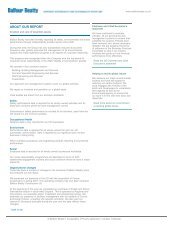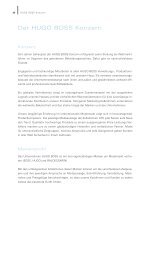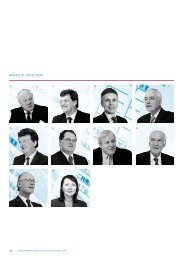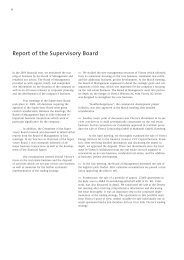E_mg_GB_03_vorne-29_3_04
E_mg_GB_03_vorne-29_3_04
E_mg_GB_03_vorne-29_3_04
Create successful ePaper yourself
Turn your PDF publications into a flip-book with our unique Google optimized e-Paper software.
56<br />
GEA: innovation that adds value<br />
The Mechanical Separation division developed and brought to market its Protein-Plus system. This<br />
enables significantly more protein to be extracted from milk. Because the system does not have to be<br />
emptied as frequently as before, its availability is improved. A further environmental benefit is that<br />
the system saves up to 600,000 liters of water per year. This provides customers with added value<br />
worth tens of thousands of euros in total per machine per year. The system’s modular construction<br />
also means that separators already in use can be upgraded.<br />
GEA’s Refrigeration division continued to make advances in the use of environmentally friendly<br />
refrigerants, especially those that are not harmful to the climate. GEA’s engineers devised a new<br />
patented process for the efficient use of carbon dioxide in conjunction with ammonia for lowtemperature<br />
applications. The company extended its range of screw compressors with the launch<br />
of a new product line. These compressors are mainly installed when environmentally friendly<br />
ammonia is used as a refrigerant. This division is therefore well-equipped to meet the needs of<br />
the market and offers its customers tailor-made solutions for their preferred application using<br />
the most suitable, environmentally friendly refrigerant.<br />
Lurgi: plastic made from gas<br />
During the period under review, Lurgi’s research and development activities focused mainly on<br />
its fast-growing gas-to-petrochemicals business. As a market and technology leader, Lurgi offers its<br />
customers innovative, inexpensive and resource-saving processes for converting natural gas into<br />
value-added chemical and petrochemical products. Under this process, gas is first converted into<br />
synthesis gas. The next stage is to turn the synthesis gas into methanol, from which petrochemical<br />
products such as plastics and synthetic fuels are finally extracted.<br />
Traditionally these products are manufactured from crude oil, which is an increasingly scarce and<br />
relatively expensive resource. Lurgi’s continuous expansion of its alternative and extremely efficient<br />
gas-to-petrochemicals and gas-to-synfuels technologies provides this plant engineering firm with<br />
outstanding business prospects.<br />
At a newly built HP POX high-pressure synthesis-gas research facility on the premises of the Freiberg<br />
University of Mining and Technology in eastern Germany, Lurgi’s engineers are working with scientists<br />
from the Institute of Energy Process Engineering and Chemical Engineering on the optimization<br />
of proprietary Lurgi processes for the production of synthesis gas. Their aim is to use extremely high<br />
pressure to convert gas and other commodities, such as hydrocarbons, even more efficiently and<br />
economically into synthesis gas before this is refined into methanol and other petrochemical products.<br />
This offers considerable competitive advantages for Lurgi’s customers, as it substantially reduces<br />
plant operating costs.









